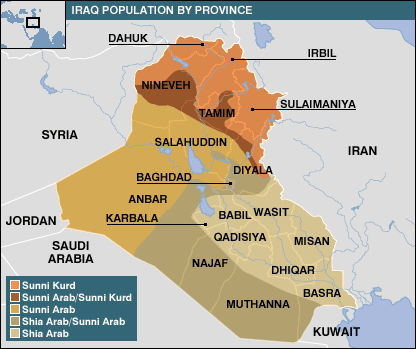Home › Forums › Political Corner › Iraq Elections 2018 and Formation of New Government
This topic contains 0 replies, has 1 voice, and was last updated by ![]() Y_ 1 year, 8 months ago.
Y_ 1 year, 8 months ago.
- AuthorPosts
Iraq Elections 2018 and Formation of New Government[1][2][3]

Background
Parliamentary elections were held in Iraq on 12th May 2018. The elections decided the 329 members of the Council of Representatives, the country’s unicameral legislature, who in turn will elect the Iraqi President and Prime Minister.
A curfew was declared by Prime Minister Al-Abadi from midnight Friday to 7 pm Saturday in all governorates except Baghdad, where the curfew started at noon Friday. A 24 hour closure of all airports and other border crossing was also implemented. The Iraqi airspace was open later on the day as well as the lifting of the curfew. Election day in Iraq was extremely successful from a security aspect, as no attacks were registered anywhere in the country.
Some commentators have noted that one difference in 2018 is the increasing number of cross-sectarian alliances, but that trend started many cycles ago, and there are currently very few electoral alliances that are likely to attract voters from across the ethno-sectarian divide. There is an argument that electoral politics have regressed in that regard: in 2010 and 2014, there was significant chatter about new civil, independent movements that contested those elections, but they have been close to absent from the current elections.

Members of the Council of Representatives are elected through the open list form of party-list proportional representation, using the 18 Governorates of Iraq as the constituencies.
Eight seats remain reserved for minority groups at the national level: five for Assyrians and one each for Mandaeans, Yazidis, and Shabaks. However, the Council of Representatives voted on 11 February 2018, to add an extra seat for minorities, in the Wasit Governorate for Feyli Kurds, making the total number of parliamentarians equal to 329.
Outcome of Elections
Two weeks after the elections delivered a surprise win for Shiite cleric Muqtada al-Sadr, and Iraq’s divided political leaders are scrambling to put together the pieces of a coalition government.
With no clear victor, however, Iraq’s government is nowhere close to being formed. Iraq’s election commission announced the results of 10 of the country’s 18 provinces. The eight provinces where the results aren’t yet known include those that make up the territories claimed by Iraqi Kurds, including Kirkuk, Salahaddin, and Nineveh.
Sadr’s Sa’iroun political bloc won 54 seats in Iraq’s 329-member parliament – more than any other political grouping, but far from the majority needed to govern. Under Iraqi rules, the biggest coalition of any kind registered in parliament will form the government.
At a May 19 joint press conference after talks with Sadr, Prime Minister Haider al-Abadi, whose Al-Nasr (Victory) Alliance came in third, said, “During our meeting, we agreed to work together and with other parties to expedite the process of forming a new Iraqi government.”
A few days later, on May 22, Al-Nasr spokesman Hussein al-Adeli said Abadi had reached an agreement with Sadr on a map for forming a new government. Abadi himself, in his weekly press conference the same day, said his coalition was close to reaching an understanding with the Sairoon Alliance “to form a strong technocratic government.”
Shiite, Sunni, Arab and Kurdish political leaders have flocked to Baghdad for negotiations with other parties in an attempt to form a grouping big enough to form a majority but still hold together amid voters’ demands for government reform.
Iraq’s first post-ISIS elections were among the most peaceful since 2003. But they have been marred by allegations of fraud in the disputed city of Kirkuk and the Kurdish city of Suleimaniyah.
Sadr, who has transformed himself from a feared militia leader to a populist, nationalist politician, has been at the center of the negotiations. He holds no official political position and, according to aides, has no interest in being prime minister. Sadr did not himself contest the election, and so cannot have a formal role in the government—which seems to suit his preferences.
His list’s performance can be attributed to a solid Shia support base and his ability to attract some minorities, but it’s not only about Sadr himself. Low voter turnout (44.5 percent) hampered support for other politicians.
But he has channeled his revered religious family’s traditional base of poor, disenfranchised Shiites into a much wider alliance. And in promising an end to patronage and party quotas, he has in many ways set the agenda for Iraq’s next government. Sadr has promised a government of technocrats that would deliver public services largely lacking for the last 15 years.
“Iraqi people are fed up with the old politicians and they want the new systems, the new people and the new styles to work with,” Sadr’s spokesman Sheikh Salah al-Obeidi told NPR at the party offices in Baghdad. “We are looking for a new kind of government. We have the main outlines of this program and we want to discuss with the other parties how to make a full program.”
Sadr greeted a group of ambassadors from neighboring countries May 19 after his list’s victory was confirmed. In attendance were the ambassadors of Saudi Arabia, Jordan, Kuwait, Turkey and Syria. Official Iranian websites, including Al-Alam’s, criticized Sadr’s relations with Saudi Arabia and charged that Riyadh had been behind Iran’s exclusion from the meeting.
Sadr insists that the largest parliamentary bloc include all Iraqi components, which would be unprecedented if successful. The largest parliamentary bloc has always consisted solely of Shiite parties, which then negotiated with Kurdish and Sunni blocs over forming the government.
On May 21, Sadr tweeted, “I am Muqtada. I am Shiite, Sunni, Christian, Saebean, Yazidi, Islamist, civil, Arab, Kurdish, Assyrian, Turkmen, Chaldean and Shabak. I am Iraqi. Do not expect me to side with any sect against the other to renew enmities and lead to our demise. We are headed toward a comprehensive Iraqi alliance.”

But the people Sadr excluded from his post may be even more significant, and they include the pro-Iran Shia alliance that finished second in the election, as well as a major Kurdish party.
After failing to assemble a parliamentary bloc under Iranian auspices consisting of the four largest Shiite lists — the State of Law Coalition and the Al-Nasr, Hikma and Fatah Alliances — Iranian Ambassador to Iraq Iraj Masjedi attempted to lure Sadr to his side to prevent the formation of an anti-Iran government. Masjedi told Iran’s Al-Alam TV May 21, “Iran has constructive relations with all parties, blocs and coalitions that won the majority of parliamentary seats in the fourth elections.”
Masjedi also denied rumors of a dispute between the Iranian leadership and Sadr, saying, “Iran’s relations with Sadr are historical and deep-seated. The country had close relations with the martyrs Mohammed Baqr and Mohammed Sadeq al-Sadr [Muqtada’s uncle and father, respectively].” Masjedi added, “Iranian officials’ relations with Sadr are friendly and brotherly, and many of them, including Soleimani, appreciate Sadr greatly.”
In fact, Sadr’s father and Iranian officials were not friendly at all. His representative in Iran, Jaafar al-Sadr, son of Mohammad Baqr, was arrested and his office shuttered in Qom in 1998. In addition, everything indicates that relations between Muqtada and Iran have gone downhill as well in recent years.
Sadr’s position also speaks to Iraq’s efforts—and interim successes—in choosing its government independently, or at least with less foreign influence than before. Sadr is strongly opposed to both the presence of U.S. troops in the country, and to Iranian influence. He maintains that he merely supports a strong and independent Iraq.
Obeidi says while previous governments have chosen a prime minister and cabinet ministers on the basis of party loyalty, a new government would agree first on a reform program and compile a cabinet qualified to carry it out.
Political leaders in the flurry of late-night meetings in Baghdad have signaled their intentions through photo ops and tweets. One tweet by Sadr, never previously known for his levity, used a play on words to indicate that his political bloc could partner with almost everyone apart from former prime minister Nouri al-Maliki.
“Maliki himself is responsible for many of the disasters that came to Iraq so it is difficult to accept him,” Obeidi said.
The bitter history between Maliki and Sadr includes Maliki sending Iraqi forces to take back Basra from control of Sadr’s Mahdi Army militia in 2008. It also includes what is widely viewed as Maliki’s deeply sectarian policies in his second term after 2010, which is blamed for contributing to the rise of ISIS.
Sadr’s Mahdi Army militia fought U.S. troops after the 2003 invasion of Iraq. They are blamed for fueling Iraq’s civil war, including sectarian cleansing of Baghdad neighborhoods. Sadr’s advisors explain his transformation into a pan-Iraqi leader who has reached out to Sunnis, secularists and minorities by saying that these are different times.

- In this photo provided by the Iraqi government, Iraqi Prime Minister Haider al-Abadi (right) and Shiite cleric Muqtada al-Sadr hold a press conference in Baghdad on May 20. Sadr’s coalition won the largest number of seats in Iraq’s parliamentary election
As Prime Minister and Chief of Staff, Maliki ordered mass arrests in sweeps of Sunni towns and cities. Political favoritism and corruption in the Iraqi army was so endemic, entire army divisions collapsed rather than fight ISIS in 2014.
Obeidi, though, leaves the door open for a coalition that could include paramilitary commander Hadi al-Amri’s Fatah political bloc, made up mainly of pro-Iranian militias — and even Maliki, if his political bloc signs onto a program of government reform. Fatah won 47 seats and Maliki’s political bloc won 26.
Obeidi predicts that forming a coalition with enough seats to govern could be done in two weeks. In Iraq’s fractured political landscape, attempts to form previous governments have taken up to six months. And although Sadr’s bloc won the biggest number of seats, there is nothing to preclude another grouping coming together with more seats, leaving the Sadrists in opposition.
In the past, his officials have met Australian diplomats, despite that country’s involvement in the U.S.-led invasion in 2003. Obeidi says Sadr would draw the line, though, at meeting American or British envoys.
“I think it is very difficult,” he says. “As [far as] I know, Sayid Muqtada Sadr still thinks there are many problems to have such a step with American officials.” (Sayid is an honorific denoting a descendant of the Prophet Mohammad).
Still, previous government ministries run by the Sadr movement cooperated with programs involving the United States, Obeidi points out. And Sadr has not objected to existing agreements for U.S. troops to play an advisory role in Iraq.
“Fixed American army bases inside Iraq are a problem for us,” he says. “But when [current prime minister Haider al-Abadi made a decision to bring American soldiers to Iraq, Sayid Muqtada Sadr did not stop his support to al-Abadi because he understands that al-Abadi made such decisions in order to help Iraq.”
Obeidi points out that Sadr also rejects Iranian interference in Iraq. Sadr has not publicly met with Iranian military commander Qassim Suleimani, who has also been in Baghdad for talks since the election.
Suleimani “will not give up trying to use his influence, but at the same time, it is up to Iraqis to stop this,” he says. “From Sayid Muqtada Sadr, he refuses such influence not only from the Americans but from the Iranians. Maybe a kind of advice here and there — but interference is refused.”
Sadr so far has indicated he is ready to partner with Abadi and Ammar al-Hakim, another prominent Shiite leader who previously headed the Islamic Supreme Council of Iraq, a major political faction. Abadi and former prime minister Maliki belong to the same party, but they created separate political blocs for this election, a move that is seen as contributing to Abadi’s relatively poor showing in the polls – just 42 seats.
And despite their differences on Iran, Sadr has met with Amri, the head of Iraq’s popular mobilization forces – mostly Shiite militias assembled to fight ISIS. The participation of Fatah in a government coalition is seen as likely to increase Iranian influence in a governing coalition, but it is clear that all parties are keeping their options open.
Kurdish politicians, who among them hold more than 45 seats in parliament, have also come to Baghdad for talks on joining a coalition.
Districts hotly contested by Kurdish political parties have prompted the most serious complaints of fraud, and some of the seats are in dispute.
In Kirkuk, Arab and Turkmen parties alleged Kurdish parties had tampered with the counting and staged sit-ins outside election centers. The politically appointed head of Iraq’s election commission asked for security forces to be called in, saying his workers were being held hostage. He was later publicly reprimanded by Prime Minister Abadi, who warned election officials not to make unsubstantiated statements.
[Y : Postscript
it is not yet known what form exactly the new government will take and how much control it will have over the various sects and regions. Iran’s views of the western powers, Iran and Saudi Arabia plus Israel will hopefully be known in the coming months. Y]This video is a BBC production of current life in Iraq.
Iraq after the Americans | Rewind (47 mins)
Citations
[1] https://www.npr.org/sections/parallels/2018/05/26/614433787/after-muqtada-al-sadrs-surprise-win-iraqs-political-leaders-try-to-form-governme
[2] https://www.aljazeera.com/indepth/opinion/expect-iraq-election-180511105905533.html
[3] https://www.al-monitor.com/pulse/originals/2018/05/iraq-election-abadi-muqtada-sadr-iran.html- AuthorPosts
You must be logged in to reply to this topic.

921526
921524
919244
916783
915526
915524
915354
915129
914037
909862
908811
908810
908500
908465
908464
908300
907963
907895
907477
902002
901301
901106
901105
901104
901024
901017
900393
900392
900391
900390
899038
898980
896844
896798
896797
895983
895850
895848
893740
893036
891671
891670
891336
891017
890865
889894
889741
889058
888157
887960
887768
886321
886306
885519
884948
883951
881340
881339
880491
878671
878351
877678













